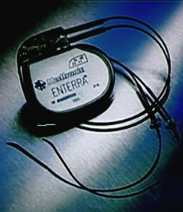Gastric Neurostimulator Implant

Gastroparesis, also called delayed gastric emptying, is a disorder in which the stomach takes too long to empty its contents. Normally, the stomach contracts to move food down into the small intestine for digestion. The vagus nerve controls the movement of food from the stomach through the digestive tract. Gastroparesis occurs when the vagus nerve is damaged and the muscles of the stomach and intestines do not work normally. Food then moves slowly or stops moving through the digestive tract.
Gastric Electrical Stimulation
When gastroparesis does not respond to standard medical management including drugs and dietary changes, the condition is said to "refactory". For patients who have documented delayed gastric emptying with no evidence of abnormal obstruction, a gastric neurostimulator may be implanted to reduce or eliminate nausea and other symptoms.

A gastric neurostimulator is a surgically implanted battery-operated device that releases mild electrical pulses to help control nausea and vomiting associated with gastroparesis. This option is available to people whose nausea and vomiting do not improve with medications. Further studies will help determine who will benefit most from this procedure, which is available in a few centers across the United States.
Gastric electrical stimulation uses a device, surgically implanted in the abdomen, to deliver mild electrical pulses to the nerves and smooth muscle of the lower part of the stomach. This stimulation may reduce chronic nausea and vomiting in patients with gastroparesis resulting from diabetes (diabetic gastropathy) or ideopathic gastroparesis (unknown cause).
